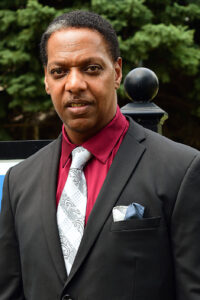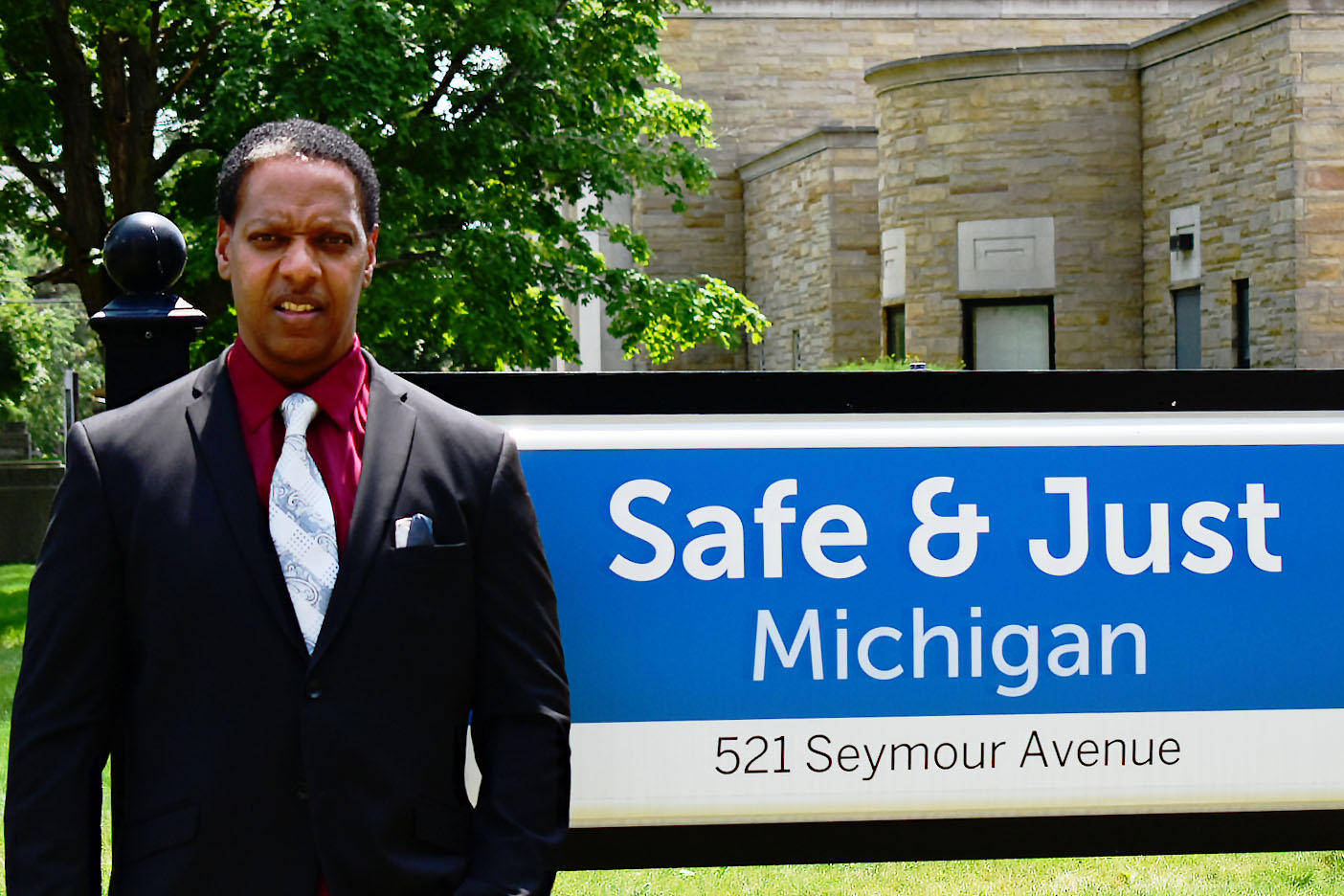Ronnie Waters was just 17 years old when he stood before a judge for his sentencing. Waters knew what was coming, so he told his mother to stay home to spare her from hearing it. Having been found guilty of first-degree murder, he knew he would be sentenced to prison for the rest of his life, even though he was still just a juvenile.
The sentence sounded final. It was meant to be. But Waters says he knew for certain he would find a way home somehow — and he was right. A series of U.S. Supreme Court rulings starting in 2012 paved the way for Waters to regain his freedom. In 2020, he was resentenced and released from prison.
Coming home, Waters had a list of things he had to do. He wanted to renew vows with his wife, spend time with his mother and become politically active.
He didn’t want to waste time feeling bitter about the decades he spent incarcerated.
“After many decades, I’m finally getting my second chance at life. However, I left a lot of good people behind, men and women who have paid their debt to society and are totally transformed human beings. We have to bring them home too.”
That’s exactly what Waters hopes to do with his new job as a community engagement specialist at Safe & Just Michigan. Working with the rest of the Safe & Just Michigan team, he will help organize events such as Clean Slate expungement fairs and information expos, help other formerly incarcerated people become politically engaged and support Safe & Just Michigan’s legislative goals, among other activities.
For Waters, it’s a job description that almost sounds tailor-made. In his vision of an ideal future, people who made bad choices and harmed others would be able to show they learned from their mistakes and are worthy of second chances — and society would grant them. There would be greater opportunities for people living in resource-challenged communities, and more mentoring for the youth who live in them.
Those were things often missing from his own childhood.
Waters parents divorced before he was old enough to attend school. After the divorce, his mother moved him and his siblings to Pontiac, Mich. There, they lived in a small house with their grandfather while their mother managed to provide for them on wages earned from fast food restaurants.
Things got little easier once his mother was hired by General Motors. Waters was a teenager by then, and his mother’s new job — and higher income — meant a move to a new neighborhood and new friends that didn’t always have Waters’ best interests in mind.
“I gravitated to guys into petty crime and destroying stuff,” he says.
One of those friends had a collection of guns. The youths took turns carrying one of the guns each time the group went out together, and whoever had the gun considered it an honor. On the night that forever changed Waters’ life, it had been his turn to carry the loaded .22-caliber pistol.
“I was told it was little more than a BB gun,” he said. “I’d tried it out on a traffic sign and a car window and saw it crack the window like a spider web without breaking it, but that was because of the safety glass. I was too young to understand that.”
The misunderstanding had fatal consequences. That night, Waters thought a stranger inside a car disrespected one of his friends. Waters says he decided to scare the man in the car with the weapon he thought was incapable of inflicting real harm. Instead, the bullet he intended to only startle the stranger wound up killing the man’s wife, who was seated beside him in the passenger seat.
Waters’ life changed in an instant. “Everything was happening at warp speed but I just didn’t understand any of it. Everything felt unreal and I couldn’t make sense of it.”
Waters always believed he should accountable for what he did, but he thought it was unfair to convict him for first-degree premeditated murder. How could he have planned to hurt someone — much less kill them — with a weapon he didn’t think could even break a windshield? His challenge was proving he didn’t know what a .22-caliber gun was capable of. How could Waters prove what he didn’t know? He couldn’t.
When it came time for his sentencing, Waters struggled to make sense of what life in prison meant.
“When you’re sent to prison at the age of 17, life to you is 17 years,” Waters explained. “What do you know about how long a life can be? It means that every day that you breathe on earth is a day you are locked up. You don’t think anyone could be that cruel.”
Being incarcerated was far from easy, but Waters said he had an advantage many others didn’t: a family that never left him. Throughout his 40 years in prison, his mother and childhood sweetheart never gave up on him. He married his childhood sweetheart, Felecia, while he was in prison. She remained true to him, even traveling to see him in Virginia in the 1990s when overcrowding led Michigan send to some of its prison population there.
“I had to beg my mother not to send money, but she still would,” Waters said. “She’d just say, share it with other people there who didn’t have any.”
Waters adjusted to prison life as well as he could, obtaining a GED, associate degree in arts and sciences and taking college courses from Central Michigan University, but never accepted his sentence as final. He always believed he would go home someday; he just didn’t know how. For a long time, he tried to prove that he hadn’t intended to kill anyone — in other words, that the charge of first-degree murder had been too harsh. That effort fell apart when police told his sister evidence from his case was no longer available.
Then, he started working with the ACLU’s juvenile justice program. The civil rights organization had been working on challenging the practice of life without parole sentences for juveniles, and Waters wanted to be a part of it.
When he learned in 2012 that the U.S. Supreme Court had ruled that juveniles could no longer be routinely sentenced to life in prison, he was overjoyed. Then, others around him pointed out that nothing in the ruling made it retroactive. He would have to wait another four years for that to happen, and even then, many people cautioned him to wait.
Waters had been sentenced in Oakland County, one of two Michigan counties — along with Wayne — notorious for denying release to people who had been sentenced to life as juveniles. But Waters believed in his heart that he was ready to go before a judge again for the resentencing the Supreme Court said he was due.
“I had done everything positive. I had gotten my GED and taken college classes. I had taken every vocational program they offered. I never had any problems and I had letters of recommendation from staffers at the prison,” Waters said. “I knew it would be hard to put ‘life’ back on my head.”
His gambit paid off, and in the summer of 2020, Waters was headed home. Without wasting time, he began to register people to vote and got to work electing a more reform-minded county prosecutor. That happened last November when former prosecutor Jessica Cooper lost in a primary to former Judge Karen McDonald, who went on to become the new county prosecutor in the general election.
Waters didn’t forget the women who had stood by him every step of the way, either. The same day he was released from prison, he renewed his vows to Felecia. And among the most meaningful things he did since coming home, he spent time with his mother, who sadly passed away earlier this year.
“People tell me she never smiled or laughed like she did after I came home,” Waters said. “I’m so grateful I got to spend more time with her before she passed.”
Looking back over his life, Waters wonders how it may have unfolded differently if he hadn’t fired a gun that night when he was 17. “I would have gone to college and been productive. I love politics. Maybe I would have run for office.”
Then, he smiled.
“I would help people and impact lives,” he said — which is exactly what he plans to do at Safe & Just Michigan.

“After many decades, I’m finally getting my second chance at life. However, I left a lot of good people behind, men and women who have paid their debt to society and are totally transformed human beings. We have to bring them home too.”

